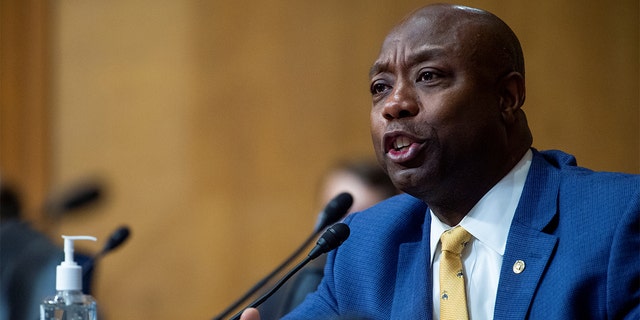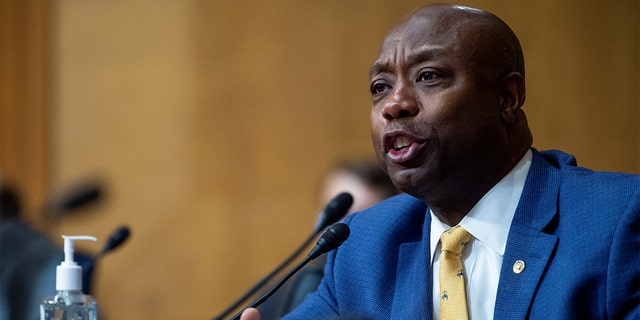
NEWYou can now listen to Fox News articles!
Sen. Tim Scott, R-S.C., issued a scathing rebuke following President Biden’s new executive order on police reform, slamming Democrats for hypocritically blocking his own police reform bill in 2020 while partially embracing some aspects of his legislation.
“After the radical ‘defund the police’ movement helped create the current crime wave, President Biden is pursuing a partisan approach to many of the exact same policy solutions I proposed in the JUSTICE Act just two year[s] ago,” Scott said in a statement after Biden issued the order Wednesday.
“The fact is Democrats used a filibuster they call racist to block my reforms that they’re now embracing,” the senator added.
POLICE GROUPS DIVIDED ON BIDEN’S EXECUTIVE ORDER ON LAW ENFORCEMENT REFORM
Biden’s reforms differ from Scott’s bill in a few crucial respects, however.

Sen. Tim Scott, R-S.C., questions Chris Magnus as he appears before a Senate Finance Committee hearing on his nomination to be the next U.S. Customs and Border Protection commissioner in the Dirksen Senate Office Building on Capitol Hill in Washington, D.C., Oct. 19, 2021. Rod Lamkey/Pool via REUTERS (Rod Lamkey/Pool via REUTERS)
“While my proposal added funding to help local law enforcement comply with higher standards, the Democrats’ proposal sets departments up for failure by issuing unfunded federal mandates,” the senator added. “Making it harder for police to do their jobs to the best of their ability should be a nonstarter, yet that’s exactly what the Biden plan does.”
“I’m disappointed that the president who campaigned on unity has once again fallen into the trap of divisive politics,” Scott concluded.
GOP SEN. TIM SCOTT SAYS RACE IS BEING ‘WEAPONIZED’ BY DEMOCRATS: ‘IT’S A VERY DANGEROUS WEAPON’
Senate Democrats, then in the minority, used the filibuster in June 2020 to block Scott’s JUSTICE Act in 2020, which Scott’s office claims would have addressed many of the issues in Biden’s executive order.

President Joe Biden speaks during an event on the White House campus, Friday, March 4, 2022, in Washington. (AP Photo/Patrick Semansky)
Biden signed the “Executive Order on Advancing Effective, Accountable Policing and Criminal Justice Practices to Enhance Public Trust and Public Safety” Wednesday afternoon on the two-year anniversary of George Floyd’s murder under the knee of a Minneapolis police officer.
The executive order “is a measure of what we can do to heal the very soul of this nation,” Biden said.
Scott’s office highlighted eight aspects of the JUSTICE Act that made their way into Biden’s order.
Scott’s bill would have required local police to maintain a system for sharing police disciplinary records; increased penalties for all law enforcement officers who intentionally submit a false police report; incentivized the use of body-warn cameras for local law enforcement; incentivized the banning of chokeholds; required the Department of Justice to develop training standards on use of force and deescalation; provided grants for improved recruitment and hiring; required new best practices on fair policing tactics; and tracked use of force or serious bodily injury incident data.
CLICK HERE FOR THE FOX NEWS APP
Some police groups celebrated Biden’s order as a “blueprint” for further Congressional action, while others dismissed it as “political theater” and faulted it for “opaqueness.”
Democrats in 2020 proposed their own police reform bill, which involved mandates, rather than incentive structures, to achieve many of the same goals.







